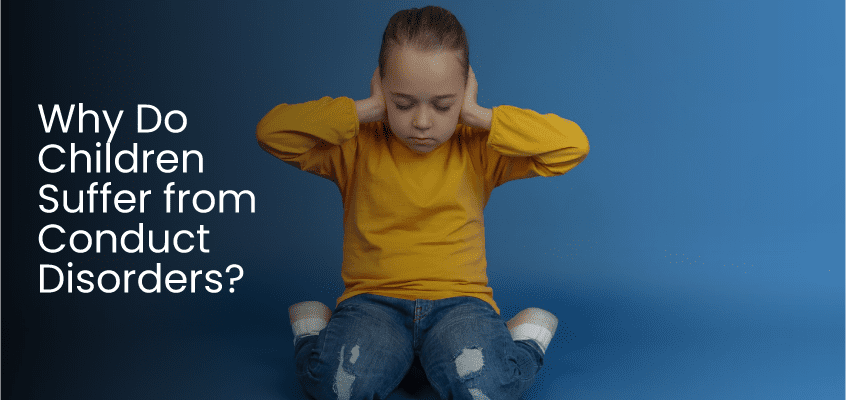Introduction
Some parents often experience a few typical behavioural problems in their kids. These problems are often repetitive. Here are a few examples:
- The child violates school rules
- Becomes aggressive toward others, or
- Disobeys instructions
- Stealing
- Physically harming people or animals
- Other antisocial behaviours
One can identify such behavioural problems in a child as a conduct disorder. Sometimes the child can have more than one behavioural problem.
Let us learn more about the circumstances and causes of conduct disorders and how we can help children having this issue.
What is a conduct disorder?
A conduct disorder is a common disorder in children and adolescents characterized by severe antisocial and aggressive behaviour. It is a highly impairing psychiatric disorder that affects a child’s development. Usually, a child with conduct disorder has low esteem and throws frequent tantrums.
The prevalence of conduct disorders is approximately 3% in school children, and it is the most common reason for the referrals of school children to mental health services. The global prevalence of the condition is almost 2–2.5%, with a majority of 3–4% in boys and 1–2% in girls.
Conduct disorders are generally less noticed in girls and occur more in boys. Genetics and environmental factors related to family and society are significant risk factors for developing conduct disorders. A conduct disorder may also occur due to brain damage or traumatic events in a child’s life.
What are the symptoms of a conduct disorder?
As parents, we must watch out for our children’s emotional disturbances and responses to certain situations. Labelling our child as a bad influence is not going to help. A conduct disorder is a psychiatric condition that needs careful handling.
The symptoms of conduct disorder may be as follows:
- Telling lies
- Serious violation of rules
- Staying away from home
- Bullying behaviour
- Intimidating or threatening others
- Physical aggression, i.e., starting fights
- Using weapons to cause serious bodily harm to others
- Cruelty towards animals
- Purposefully initiating a fire to cause severe damage
- Stealing without confronting a victim
- Cheating
- Disturbed relationships with peers
- Force someone into sexual activity
- Deliberately destroy others’ belongings
- Break into someone else’s house or car
What are the causes of a conduct disorder?
The exact cause of a conduct disorder is unknown. Scientists have established different risk factors as the leading causes of conduct disorders at various stages of life.
Genetics plays a vital role in causing conduct disorders. The genetic variations inherited from parents may make them more reactive to emotional stimuli and less capable of regulating emotions.
Additionally, the family environment and factors related to society play a role in causing conduct disorder in school-going children and adolescents. The environmental causes are as follows:
Prenatal factors:
- Smoking
- Alcohol
- Drug abuse
- Stress
Postnatal factors
- Birth complications
- Psychology of mother and father
- Malnutrition
During childhood and adolescence
- Harsh, inconsistent disciplinary methods
- Poverty and low socio-economic status
- Strained parent-child relations
- Abuse at home
- Association with ill-mannered peers
What are the effects of a conduct disorder?
The interplay between genetics and environmental factors can result in a child developing a conduct disorder. Every phase of life displays the effects of these psychiatric conditions. The observed effects of a conduct disorder are:
- Cruelty
- Aggression
- Broken relationships
- Physical fights with peers
- Tendency to hide the truth
- Inability to hold a job
- Forced sexual activities
- No remorse.
Sometimes conduct disorders come bundled with other mental illnesses such as depression, anxiety, and attention deficit hyperactivity disorder (A.D.H.D.). Children with learning disabilities or anxiety disorders are more likely to have conduct disorders.
Treatment measures and role of parents to help their child suffering from a conduct disorder?
A conduct disorder needs to be treated as a behavioural and emotional disorder as soon as possible. You can avail of therapy options in a clinic or home setting. One must start therapy as early as possible to avoid future complications.
Psychotherapy can improve the child’s skills and anger management and may also help reshape the child’s thinking abilities.
Parents’ awareness and training in handling children are essential to therapy. Sometimes the child may display non-cooperative behaviour during treatment. Parental intervention in such scenarios can tackle this challenge.
Here is how parents can help their children suffering from a conduct disorder:
- Make time for all the appointments with the child or adolescent psychiatrist.
- Be a part of family therapy.
- Talk to the team of therapists about the problems the child is facing.
- Work with your healthcare provider in chalking out the treatment plan.
- Be a part of play sessions and group exercises.
- Take part in positive parenting techniques, which are always fruitful. Improve family communications. Connect more with children. Try developing a stronger parent-child relationship so the child will feel safe at home.
- Enrol in parent management training, a specialized therapy that will help parents learn valuable techniques to deal with their children.
- Tell the school authorities about the problem.
- Reach out for support. Join a support group. Being in touch with other parents having similar issues with their children will help you cope with your situation.
Conclusion
It may not be possible to prevent conduct disorders from developing. However, early diagnosis and treatment will improve the child’s quality of life and family.
We should not overlook a conduct disorder as lousy behaviour or tag children as bad people. Instead, look for ways to deal with this problem with the help of therapies and medications if needed.
We should try to develop empathy in children and connect with them. Proper nutrition and a supportive environment at home can also help reduce the severity of the conduct disorder.









